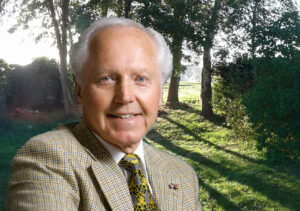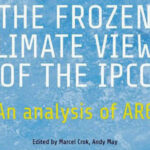
Guus Berkhout.
By Guus Berkhout.
Dear Prime Minister,
Faith in the future is a principal source of happiness. That’s why many of my generation have fond memories of the 60s. Although prosperity was much less than today, we firmly believed in continuous human progress. Everything in the future was expected to be better.
How different is that today! Prosperity now is much higher than it was back then, but our faith in the future seems to have vanished from altogether. Today’s generation is constantly bombarded with pronouncements by climate prophets who advocate doom and gloom about the future of our planet. For many years they have been told that hundreds of billions are required – in our country alone! – to prevent catastrophic climate disasters. According to the climate activists, it’s five to twelve! But is it?
Dear Prime Minister,
I know that you would like our country to be in the vanguard of the fight against climate change. But are you aware that you have been consistently misinformed? Do you realize that reality is very different from the gloomy image that has been presented to you? Are you also aware that would all those costly climate plans envisaged today be implemented, the increase in global temperature at the end of this century will only be 0.00030 C less than if we would have done nothing at all? This temperature increment is so small that it can’t even be measured! Shouldn’t we better spend public money on issues of more immediate importance?
In my letter, I would like to present to you five de facto mistakes in the arguments that make up your proposed climate policy:
- The claim that 97% of climate scientists are convinced that global warming is caused by mankind (AGW) is a truly manipulated claim. Of the 11.944 papers on climate change that were investigated, only 41 articles explicitly endorsed the man-made global warming hypothesis (only 41 out of 11.944!) and the remaining papers expressed doubts or did not express an opinion at all. But even if the 97% would be true, Prime Minister, please bare in mind that scientific progress was never the result of a consensus, but always resulted from original thinkers outside the mainstream.
- Climate change follows incredibly complex processes and the underlying science is far from settled. In particular, little is known about the major effects of clouds (water vapour) and the dominant influence of oceans. In addition, the latest scientific results and measurement show that the impact of CO2 on the atmospheric temperature is significantly smaller than previously estimated.
It appears therefore that the temperature predictions of climate models have always been far too high, resulting from this underestimated complexity. Consequently, the related doom stories are not based on facts but largely on fiction. - Climate research has been marred by dubious scientific behaviour. Temperatures from earlier warm periods were adjusted downwards, with the result that today’s high temperatures seem unique in history. They are not! Moreover, recent temperature measurements haven been adjusted upwards, with the result that measurements and modelling results seem to match. But they do not! Why are these deceptive actions taken in the name of science?
- The potential energy to be harvested from sun and wind is by far not enough to cater for the needs of our economy. This is partly due to technological constraints, partly because of lack of sunshine and wind speed. The Netherlands experiences not much sunshine and wind, the supply of which is also affected by large swings. Moreover, our country is wealthy and therefore uses a lot of energy. As one of the most densely populated countries in the world, it is not an appealing prospect to cover our territory with wind farms and solar panels. But the reality is even more problematic. We will, in addition, also have to keep an expensive fossil–fuelled electricity generating back-up system operational to supply the country with energy on days of little sunshine and wind.
- Burning biomass has often been mentioned as an option. But it is significantly worse than burning coal. Green hydrogen, than? Unfortunately, hydrogen is a rare gas in nature. Man himself must therefore produce hydrogen, and for that, cheap green electricity is needed. But we just don’t have this type of electricity.
In conclusion, the climate science is far cry from being settled. The natural phenomena ‘sun plus wind’ will never be able to provide the required amount of energy in our country (certainly not in a reliable affordable way), the burning of biomass is worse than the burning of coal and green hydrogen is only an option when sufficient green energy to produce it is available.
But what should really concern you is the fact that our society is subject to an ever-increasing polarization. More and more citizens do not want to see the Netherlands turn into a jungle of subsidized wind turbines and solar panels. They are increasingly realizing that the positive effect of all proposed actions and investments on the climate is marginal, but the negative effect on their income is huge.
That is why, Prime Minister, my compelling message to you is that the Dutch approach to establish a climate policy must change. It is of utmost importance to separate and disconnect the environmental and climate policies, stop extensive logging for wood burning, temporize the prohibitively expensive energy transition and provide citizens with honest information on national costs involved.
 The latest scientific findings show that we have plenty of time to include the knowledge of critical experts, who until now have not been allowed to sit at the climate roundtables and participate in the discussions that solemnly affect our future. Let us draw up a much stronger national plan, based on a dual strategy: adapting to matters over which man has no control (‘adaptation’) and preventing matters over which man can exert influence (‘mitigation’). Let us forget the doom and gloom stories of the past and let us restore faith in the future.
The latest scientific findings show that we have plenty of time to include the knowledge of critical experts, who until now have not been allowed to sit at the climate roundtables and participate in the discussions that solemnly affect our future. Let us draw up a much stronger national plan, based on a dual strategy: adapting to matters over which man has no control (‘adaptation’) and preventing matters over which man can exert influence (‘mitigation’). Let us forget the doom and gloom stories of the past and let us restore faith in the future.
P.S. In a formal reaction to the book ‘Hundred authors against Einstein (1931)’, Einstein responded: “Why hundred? If I were wrong, one would have been enough.”
***
Professor Guus Berkhout is a member of the Royal Netherlands Academy of Arts and Sciences (KNAW), The Netherlands Academy of Engineering (AcTI), honorary member of the Society of Exploration Geophysicists (SEG) as well as honorary member of the European Association of Geoscientists and Engineers (EAGE). He is recipient of the Royal Decoration ‘Officier in de Orde van Oranje-Nassau’.






Wie weet maakt de brief in het Engels wel indruk moet Guus B gedacht hebben. En de aanhouder wint! zegt het spreekwoord. Geen krant die aandacht heeft geschonken aan de brief. Dat is natuurlijk ook ook niet zo raar als je naar de inhoud kijkt.
https://www.climategate.nl/2019/04/open-brief-aan-mark-rutte/
“Geen krant die aandacht heeft geschonken aan de brief.”
Dat komt omdat alle kranten van slechts twee uitgevers zijn die ook nog eens beter worden van klimaatangst en globalisatie.
Wij noemen dat de lugenpresse.
“Dat is natuurlijk ook ook niet zo raar als je naar de inhoud kijkt.”
Vindt iemand die zichzelf geweldig moreel superieur vindt en zijn dagelijks leven slijt met prietpraat en gezellig keuvelen op deze website.
Chapeau Vruggink. Je hebt vandaag voor de middag al de beker voor meest zure opmerking te pakken. *\(^o^)/*
Nee Cornelia, de reden dat er geen degelijke krant aandacht aan heeft besteed is omdat de brief vol leugens en twijfelzaaierij staat. Zaken die steeds weer door klimaatclowns wordt herhaald, maar al jaaaaaaaaaaaaaaaren geleden ontkracht zijn als misleiding. Zoals “only 41 out of 11.944!” of ” been marred by dubious scientific behaviour.”
Er kunnen heel wat redenen aangehaald worden om het klimaatBELEID anders aan te pakken. Maar leugens over klimaatWETENSCHAP, dat is geen goede reden. Daarom dat zo’n brief terecht genegeeerd wordt.
Ach, 97%, 11944 papers. Als het werk hout zou snijden was een dozijn wel afdoende geweest.
Climategate heeft natuurlijk nooit plaatgevonden. En het bijstellen van de temperaturen gebeurt uiteraard met de zuiverste intenties.
Beetje net als met vaccins. 97% van mensen denkt dat vaccins voorkomen dat we allemaal dood gaan aan de mazelen. Een blik op de data toont aan dat mazelen al niet meer relevant was in de jaren voordat we begonnen met vaccinatie.
Maar om de een of andere reden vind men het niet nodig dit te benoemen op het 8 uur journaal bij een item over de mazelen en vaccinatie.
Net zoals er besloten wordt om eenzijdig te informeren over vaccinatie, zo is men ook van mening dat eenzijdig informeren over klimaat het beste is.
Waarschijnlijk allemaal mensen die oprecht denken goed bezig te zijn, maar helaas niet intelligent genoeg zijn om de langetermijn effecten te kunnen zien. Laat staan dat ze kaas hebben gegeten van geopolitiek.
“dat mazelen al niet meer relevant was in de jaren voordat we begonnen met vaccinatie.”
Anton, kijk eens goed naar het effect van de invoering van vaccinatie in de US. Het ging. van 500.000 gevallen per jaar naar zo’n 20.000 in 5 jaar!
https://en.m.wikipedia.org/wiki/File:Measles_US_1944-2007_inset.png
Ik vermoed dat de blogjes die jij leest over klimaat of vaccinatie, nogal “eenzijdig informeren” en zich niet al te veel aantrekken. Zij presenteren nogal selectief de stukjes van feiten die hen aanstaan en negeren de rest.
Het aantal gevallen van mazelen in de VS is niet relevant voor Nederland.
Het aantal doden in Nederland door mazelen is dat wel. Zie pagina 21 https://www.rivm.nl/bibliotheek/rapporten/213676008.pdf
Van meer dan 2000 begin 20e Eeuw, naar slechts enkele begin jaren ’70. Dat bedoel ik met niet relevant meer zijn.
De bangmakerij om mazelen is dus, kijkend naar deze data volstrekt niet nodig.
Daarnaast is het interresant om te zien dat de mortaliteit van diverse andere zieken ook aan het teruglopen was. Het verband tussen vaccinatie en afgenomen sterfte komt daarmee dus op losse schroeven te staan. Ook omdat de sterfgevallen aan zieken waar geen vaccin voor is ook teruglopen is, soms zelfs naar nul.
De data geeft wat dit betreft de anti vaxers gelijk.
Het immunsysteem en menselijk lichaam is complexer dan het klimaat. Het blinde geloof in het idee dat er geen nadelen kunnen zitten aan vaccinatie vertoont grote gelijkenis met het blinde vertrouwen in (C)-AGW.
Voor de werkzaamheid van een vaccin moet je niet kijken naar doden, maar naar infecties. En dan is het aantal gevallen van mazelen in de VS wel relevant, want de werkzaamheid is onafhankelijk van het land.
Maar de antivax lobby wil natuurlijk dat je niet naar infectiegraad kijkt. Ze willen ook niet dat je weet dat alle overlijdens in Europa aan mazelen allemaal niet/slecht gevaccineerden zijn. Vaccinatie beschermt immers tegen mazelen.
Het is geen “blind geloof”. De data tonen gewoon aan dat kindervaccinatie veilig en werkzaam is.
aan polio overlijd je niet.
Waarom zou je vaccineren tegen iets wat niet dodelijk is? Ga jij je straks elk jaar laten inenten als er een vaccin tegen verkoudheid is?
Vaccinaties kunnen wel degelijk bijwerkingen hebben, deze staan ook gewoon vermeld in de bijsluiter. Bij acceptatie testen van medicijnen is de onderzoeksgroep relatief klein ten opzichte van het totaal. Niet alle bijwerkingen zullen gevonden worden, vandaar dat farmacovigilantie bestaat.
Daarnaast zou het goed kunnen dat het doorstaan van een kinderziekte positieve gevolgen kan hebben.
Bij een gezonde discussie zouden deze aspected aan bod moeten komen. Maar het blinde geloof in het 100% goede van vaccins verhindert dit.
De HPV vaccinatie campagne is het absolute dieptepunt wat dit betreft.
“Waarom zou je vaccineren tegen iets wat niet dodelijk is?”
Van mazelen kun je doof worden.
Van polio krijg je kinderverlamming.
Van HPV kanker
Enzovoort….
En de bijwerkingen van vaccinatie zijn veeeeeeeeel minder erg.
“En de bijwerkingen van vaccinatie zijn veeeeeeeeel minder erg.”
Ik denk dat er genoeg mensen zijn die achteraf liever voor de kans op een ziekte en kans op complicaties hadden gekozen. Zeker in het geval van hpv.
Voor polio ligt deze afweging uiteraard anders.
Guus B heeft miljoenen gekregen van sympathisanten om deze brief te schrijven. Ik denk dat Guus B degene is die in een deuk ligt van het lachen. Wie is eigenlijk de penningmeester van CLINTEL?
Dit was als antwoord op de echte en almachtige Guido die moest lachen om de brief. Maar die reactie is weggehaald.
de vergelijking met het mentale klimaat van de jaren ’60 is treffend.
Op de argumenten is niets aan te merken.
Merkwaardig is daarom de openings reactie hierboven.
De schrijver lijkt ergens last van te hebben, voelt blijkbaar de behoefte
het schrijven te marginaliseren, maar zijn beweegredenen blijven onduidelijk.
Zien we hier een slachtoffer van de existentiële angsten die de milieubegingen ons nu al decennia inpeperen?
Niet iedereen staat even stevig in zijn schoenen.
Ja, vergelijkingen met “weet je nog van vroeger” is treffend.
“Op de argumenten is niets aan te merken.”
Er is juist heel wat op aan te merken. Verschillenden ervan zijn al jaren geleden ontkracht!
Er kunnen heel wat redenen aangehaald worden om het klimaatBELEID anders aan te pakken. Maar leugens over klimaatWETENSCHAP, dat is geen goede reden.
@Hdj 28 apr 2019 om 14:00 ‘ Verschillenden ervan zijn al jaren geleden ontkracht!’ Je doelt voor de verandering nu eens op de CAGW-fabel en de 97%-mythe. Die zijn immers genoegzaam ontkracht. Daarom is die brief zo belangrijk.
Hetzler, de bewering van jou dat de AGW een fabel is, is al lang ontkracht. De bewering dat er geen overgrote meerderheid van klimaatwetenschappers achter de AGW-theorie staat is ook al lang ontkracht. En de bewering van de ” 41 out of 11.944!” in die brief is ook al lang ontkracht als een foutieve interpretatie van de gegevens. Daarom is de brief gewoon irrelevant. Ik herhaal daarom nogmaals: “Er kunnen heel wat redenen aangehaald worden om het klimaatBELEID anders aan te pakken. Maar leugens over klimaatWETENSCHAP, dat is geen goede reden”
Merk op hoe Henk alweer impliceert dat CAGW = AGW.
Dat is niet zo.
Inderdaad Hans Erren. De “C” is gewoon subjectieve stemmingmakerij. Daarom dat ik die nooit vermeldt.
Dat mag jij wel vinden Henk, maar dat is niet zo.
Ik weet niet waar Guus het over heeft, ik zit vol hoop dat we het klimaatprobleem kunnen tekkelen, het enige wat me echt droevig stemt dat er mensen zijn die menen het beter te weten dat wetenschappers die dagelijks onderzoek doen naar een thema (zoals bijvoorbeeld Guus Berkhout) en dat er mensen zijn die er goedgelovig achteraan lopen (zoals bijvoorbeeld Cornelia)
Als Guus het echt beter zou weten had hij wel een wetenschappelijke publicatie geschreven in plaats van een brief aan Mark Rutte
Ik heb ergens wel eens gelezen
” In a formal reaction to the book ‘Hundred authors against Einstein (1931)’, Einstein responded: “Why hundred? If I were wrong, one would have been enough.”
En dat geld natuurlijk ook voor de wetenschap achter klimaatverandering. Maar goed, met een half miljoen of zo op de bank is er schijnbaar behoeft aan het verspreiden van onzin om te laten zien dat je iets doet voor je geld. Wiens brood men eet en zo…..
Ik ben normaal gesproken niet snel van de complotten, maar in dit geval…
Lol
“Ik weet niet waar Guus het over heeft”… dat is al tijden duidelijk, Heyden
Je kunt deze brief ook naar alle partijen sturen. Info@huppeldepup. Behalve cda. Wi@cda.nl
Je kunt ook naar info@tweedekamer.nl sturen.
Info@eerstekamer.nl
Na die open brief en nu die open letter wil ik alleen nog maar het antwoord vernemen van Rutte.
Mvg,
Frans
Wat je kan doen is je favoriete kamerlid aanspreken of hij/zij vragen wil stellen n.a.v. de open brief…. Die vragen moeten beantwoord worden. Het lijkt er op dat er ook geen kamerleden zijn die de brief de moeite waard vinden. En zelfs Marcel Crok, toch medeoprichter van de geheimzinnige organisatie CLINTEL, heeft op zijn site de brief niet geplaatst.
Hermie
Heb jij voor mij een kamerlid met enige kennis van zaken? En dan bedoel ik kennis die verder gaat dan het weten dat er een samenvatting van het IPCC rapport door het KNMI bestaat.
Geen idee Peter. Moet dat dan? Guus B heeft ook geen kennis van zaken.
“En zelfs Marcel Crok, toch medeoprichter van de geheimzinnige organisatie CLINTEL, heeft op zijn site de brief niet geplaatst.”
Interessante vaststelling!
Verder merk ik ook op dat Berkhout die brief blijkbaar niet ondertekent in naam van CLINTEL, maar in eigen naam. Dus zou CLINTEL er niet achter staan?
Vast wel Henk, De Foundation is op 8 maart opgericht. Als we Marcel Crok moeten geloven….. https://www.youtube.com/watch?v=iLrbo5LYgHQ
Nog eens goed kijken en luisteren…..
Laten we Pieter Omzight er naar kijken, hij zal het verder wel uitzoeken.
Kans groot dat het kabinet valt door de klimaat hysterie.
Die Jetten is ook een grote griezel die verrekt van de leugens.
https://www.dagelijksestandaard.nl/2019/04/syp-wynia-ontkracht-klimaatretoriek-kabinet-en-zegt-kans-groot-dat-kabinet-rutte-valt-door-klimaatbeleid/
Mee eens met de Wynia-analyse van RutteIII-kabinet!
Rutte is klaar voor de functie van Voorzitter van de Europese Raad (opvolger van de Poolse Donald Tusk: sinds 1 december 2014 en zijn termijn eindigt op 30 november 2019).
Rutte heeft daarvoor hard gewerkt aan zijn benodigde “groene” blazoen, en dat het klimaatakkoord mislukt en het kabinet valt zal voor hem (na 9 jaar) geen al te grote zorg zijn.
Ook de VVD en CDA blijken klaar met de CO2-klimaat-dogma’s van D66 en CU, er zit geen politiek winst in voor VVD en CDA.
Nou ja, nu breekt mijn klomp. Zie net op het 8 uur journaal via de satelliet, dat er toch nog eens gekeken moet worden naar het verstoken van biomassa, want wellicht is het toch niet zo positief als men eerst dacht.
En we wisten het toch allemaal zo zeker en al die demente zeikerds van een klimaatsceptici moesten hun mond maar houden want dat waren nou eenmaal GEEN wetenschappers.
Lees voor “wetenschappers”; filosofen, sociologen, pubers, actrices, songfestivaldeelnemers en geestelijk gehandicapten met Asperger.
Och, de zoveelste scheur in het alarmistenfront die zichtbaar te wordt.
PS.
Hoe lang zal het duren voordat een van de bekende alarmtrollen komt met de voorspelbare reactie in de zin van:”Nou, wat zijn dan die andere scheuren?”, waarbij natuurlijk gevraagd zal worden naar “wetenschappelijke onderbouwing”.
Jongens, kom er maar in; ik ben er klaar voor.
Zullen ze leuk vinden bij Chemelot die flink aan het werk zijn met hun bio-fabriek.
Heel Limburg en Brabant zou er terecht kunnen met het mest overschot.
Als je ergens niet meer op kunt vertrouwen is het de overheid.
Die uilskuikens waren jaren terug van plan bijna het hele leger af te schaffen, en ja bijna de helft hebben ze inderdaad verkocht.
Nu beginnen ze langzaam een beetje terug te komen op hun daden en weer wat spul te kopen, omdat ze bijna niet meer mee telden, ze liepen met vodden om hun lijf rond op oefening in koude gebieden.
Hadden ze nu nog een warmtepomp en zonnecellen op de helm gehad dan liepen ze er tenminste nog warmpjes er bij.
Zo wil de overheid dat toch, en natuurlijk een electrische aangedreven leopard tank.
@vdHeijden De grap is dat er in het geheel geen sprake is van een klimaatprobleem. Het is een politiek ‘probleem’ geworden gemaakt door allerlei wijsneuzen. Precies zoals het kernafval ook een politiek ‘probleem’ is zonder een technisch probleem te zijn. Dit is steeds de zelfde onzin die CAGW-aanbidders uitbazuinen bij gebrek aan deugdelijke onderbouwing en vanwege voortschrijdende weerlegging van doemscenario’s. Het komisch gehalte stijgt er wel door. Da’s dan mooi meegenomen. Als je Berkhout niet kunt volgen, dan ligt dit aan jou. Maar ik vrees een beetje bluf.
Zucht … watermanagement aan zee:
https://uploads.gscdn.nl/uploads/2d401cfd4a_Screenshot_2019-04-28_at_14.40.52.png
via: https://www.geenstijl.nl/5147395/klimaatgekkies-goed-geregisseerd-door-nos/
Sorry (m’n broer) Moet zijn Peter R. het hagelt (duiveneieren als tennisballen)
In deze blog komt Henk dJ weer veel aan het woord en hij heef kennelijk de wijsheid in pacht. Ik reageer nog maar eens op de alsmaar herhaalde beweringen van deze Henk dJ (klimaatwetenschapper van beroep??) dat er geen twijfel is aan de onderzoeken die zouden aantonen dat 97% van alle klimaatwetenschappers de AGW theorie (in de volle breedte) zou onderschrijven.
Ik begrijp werkelijk niet dat hij dit nog steeds durft vol te houden, terwijl deze fabel al meerdere malen onderuit is gehaald.
Wat weet Henk dat wij niet weten? Zou Henk op deze vraag met inhoudelijke argumenten in willen gaan, denkt u?
Het gaat Henk dJ en consorten ook helemaal niet om een serieuze discussie, anders zouden ze niet een dergelijk toon aanslaan. Van Climategate begrijp ik niet dat dergelijke reacties doorgelaten worden.
Als je boven de 40 bent ben je volgens jou dement.
Hoe is het gesteld met de leeftijd van de respondenten en de onderzoekers?
Voor een politicus is consensus van belang, voor een wetenschapper niet; die wil juist de consensus doorbreken.
Willem. Henk geeft geen inhoudelijk commentaar. Hij geeft alleen commentaar.
Willem, indien er geen brede consensus zou zijn, waar zijn dan al die klimaatwetenschappers die volgens jou nog twijfelen aan de agw-theorie? Waarom horen we niet van hen op deze blog? Waarom kon men er geen vinden om op de ‘ontgroeningsdag’ iets te presenteren? Waarom worden ze niet foor Baudet bewierookt?
Omdat er geen zijn….
Het gaat hier over een open brief aan de Minister President in het Engels die eerder ook is verschenen in het Nederlands, niets mis mee.
Wat het Rijksvaccinatieprogramma hiermee te maken heeft ontgaat mij helemaal, is er een vaccin dat kan voorkomen dat mensen idiote denkbeelden gaan verspreiden?
Die 97% van John Cook, n.l. dat zij van alle (klimaat)wetenschappers ter wereld de conclusie in het “Climate Change Reprt- AR5” uit 2013/2014 van het Klimaatpanel van de VN (IPCC) onderschrijven, is te gek voor woorden. Is er een lijst gemaakt waar al deze wetenschappers te vinden zijn met naam en hun contactgegevens? Heeft John Cook hen afzonderlijk gevraagd of zij instemmen met dit rapport, hoeveel hebben gereageerd enz. Wel ik kan die lijst niet vinden en John Cook blijkbaar ook niet.
Echter die 97% blijft maar rondzingen, ook bij Chris Segers fractievoorzitter CU, want hij houdt daar nog steeds aan vast, omdat hij zelf geen verstand heeft van het klimaat zo zegt hij en dus moet af gaan wat klimaatwetenschappers zeggen. Zo zijn er velen en die moeten dan beslissen over concept-regeringsbesluiten, daar valt niet mee te praten, want zij geloven dat ze gelijk hebben, dus tegengas is zeer wel nodig.
Marinus de Korte
Dat komt omdat die “wetenschappelijke” rapporten met zo’n snelheid uitkomen, door de onderzoekssubsidies voor het klimaatalarm, dat geen Kamerlid het meer kan bijhouden.
Daarom moest er ook een samenvatting van het rapport van het IPCC komen voor de politiek. Die hebben, gezien het grote aantal onderwerpen dat langs komt, ook geen tijd zich in de kwestie te verdiepen. Het is gewoon tekenen bij het kruisje op advies van een Kamerlid dat wel van wanten denkt te weten.
@Marinus, je zou eens een poging moeten doen om de meer dan 10 studies te lezen die vaststellen dat er een overgrote meerderheid is, in plaats van zo willekeurig om je heen te slaan met ongefundeerde loze beweringen.
Een beetje inzicht kan echt geen kwaad…
Ik lees deze zinloze discussie, sorry het heen en weer gooien van woorden en niet eens argumenten, met grote tegenzin.
Waarom dan? Omdat hoor en wederhoor in onze democratie thuis horen, en verder een onderdeel zijn van gezond wetenschappelijk denken. Die Henk DSj (disc jockey??) smijt maar weer “feiten” in de strijd, maar ziet hij dan niet dat dit volkomen onbewezen woorden zijn. Net zoals hij heer B verwijt.
Nu ken ik heer B een beetje en die heeft een indrukwekkende staat van dienst als wetenschapper met een onafhankelijke mening.Iets waardoor hij in het verleden al een met bv de overheid gebotst geeft, en waardoor hij nu weer botst. Kan die Henk de jockey daarop ook prat gaan, en die andere discipelen van klimaat religie. De woorden van die henk zijn voor een man als B beledigend!!!
Mensen Luister toch eens naar een andere mening en overweeg dat! Laat eens wat ruimte voor ook Uw twijfel ontstaan. Of is zelf denken in deze digital gadgets tijd te moeilijk geworden?
Wilt U dan zo graag een catastrofe beleven, is een wereld ondergang aan co2 leuk??. Nee toch, dus als er dan een uitweg geboden wordt dan overweeg je dat toch. Het is namelijk geen 2 voor 12!! Zie eens in dat de zaak van IPCC op politiek grond staat, niet wetenschappelijk! En als je moeite hebt te geloven dat wetenschappers van naam zich buigen naar hun betaal meester (dat heet ook wel prostitueren) om fondsen voor onderzoek te krijgen dan moet je maar eens kijken hoe bv de amerikaanse universiteit’s R&D funding in elkaar zit. Soms is het niet zo handig om een tegendraads rapport te schrijven.
Kijk, dat kan iemand als heer B zich wel veroorloven. Zijn geluid is niet veranderd door een beetje funding van een filantroop. Nee, die financiën werden juist aangeboden om zijn andere geluid ook wat kracht te geven. Iets wat bij de politieke onzin machines van IPCC etc niet nodig is want daar gaat nml al uw belasting geld naar toe, gesluisd via politici die als eerste de “feiten” van de IPCC en andere klimaat guru’s krijgen aangereikt. U ziet nog verband??
De oudste truc in de wereld is van politici om de burger angst aan te jagen zodat hij in lijn gaat lopen en hun politieke boodschap aanvaardt. Het ook de basis voor de gehoorzaamheid van de gelovige mens. Men verzoekt de toorn van de heiland als je niet doet wat de paus zegt! of wist U dat niet……
Ik geloof best dat de woorden van Henk DS beledigend zijn. Moeten we Guus B de kletsmajoor sparen dan? Op basis van wat? Zijn leeftijd? Zijn gebreken? Zijn vermeende staat van dienst? Schei toch uit man.
Reactie:
Ik geloof best dat de woorden van Henk DS beledigend zijn. Moeten we Guus B de kletsmajoor sparen dan? Op basis van wat? Zijn leeftijd? Zijn gebreken? Zijn vermeende staat van dienst? Schei toch uit man.
Dit schreef een zekere Hermie. een stem zonder nuance of enige zichtbare kennis van zaken die overal doorheen toetert en denkt de onwetende mens wel eens even van wijsheid te moeten voorzien!
schei toch uit man; tegen wie heb je het?
Waar is de staat van dienst van Hermie die haar schijnbaar het recht geeft persoonlijke opmerkingen te maken over een eminente grise met staat van dienst. Eén die probeert de angst uit de samenleving te halen, een angst waarop menigeen wil teren, ook die Hermie. Lekker veilig vanuit de geborgenheid van de groep schreeuwen naar die ander die op eigen benen een mening heeft gevormd. Hoef jezelf geen mening te hebben of na te denken. Prima, zo stond Rome ook lange tijd in het middelpunt van het heelal.
Hoe komt het toch dat schijnbaar iedereen een expert is geworden in een uiterst complexe natuurkundige wereld terwijl de meesten hun schooltijd en de bijbehorende basis kennis al vergeten zijn. O ja, dat is een van de voordelen van tot de veilige groep behoren. Je hoeft alleen maar te geloven en het clublied goed na te zingen!!
Je hebt het laatste woord gekregen van de moderatie. Ik mag niet meer op je reageren.
P oosterling,
En hoe is Guus B expert geworden in een veld van wetenschap waar hij 0 wetenschappelijke publicaties op zijn naam heeft staan?
En waarom loopt Guus B weg uit het debat nadat hij zijn stukje heeft gepubliceerd?
Of is alles wat Guus B zegt per definitie waar ?
ik heb geen enkele behoefte op de woorden die je buiten zicht van dit forum op mij afstuurt te reageren.
De kleinerende en respectloze toon geeft wel aan met wie ik te doen heb.
P. Oosterling,
Ik heb Hermie in de spam gezet wegens schending van de huisregels.
Hans Labohm,
Prima reactie, het beledigen van wie dan ook is gebrek aan woorden.
Niemand heeft een antwoord gegeven op mijn vraag hoe de hoogleraar John Cook en webbeheerder van SkepticalScience.com aan een contactlijst is gekomen waar alle (klimaat)wetenschappers van de wereld te vinden zijn. Ik heb vele studies en artikelen gelezen en bestudeerd over het klimaat van zowel klimaatalarmisten als klimaatsceptici, de term klimaatontkenner is een onzinnige kwalificatie want het klimaat en het weer kun je niet ontkennen, het is er gewoon en is op vele plaatsen anders, vandaar de klimaatclassificatie van Köppen.
Bij mij gaat het er om wat wel en niet waar is en waar twijfel over bestaat. Op het Goese Lyceum hebben ze mij in de 2de helft van de jaren vijftig, waar ik HBS-B heb gevolgd, goed bijgebracht hoe je wetenschappelijk moet denken, dat was het prille begin. Ik ga hier niet mijn cv verder onthullen, want daar gaat het niet om.
Verder spreken de onderwerpen op deze website mij erg aan en vele artikelen zet ik op mijn Facebook-pagina, voorzien met commentaar, die ook weer gedeeld worden door anderen, waarbij ik heb aangegeven dat de tegenreacties op het klimaatbeleid van de regering massaal zullen plaatsvinden wanneer het hen duidelijk wordt dat die maatregelen hen veel geld zullen kosten en dat is nu aan het gebeuren. Dus gewoon doorgaan met informeren en reageren, ik doe dit regelmatig door alle fractievoorzitters een Email te sturen met mijn bevindingen, sommigen geven een automatische ontvangstbevestiging, maar anderen ook een reactie en tot mijn verbazing ook namens Rob Jetten, D66 waarin werd aangegeven dat mijn Email als informatie in de fractie was rondgestuurd zodat dit in debatten gebruikt kan worden. Of dit echt gebruikt wordt is een andere zaak, maar je weet maar nooit, ontkennen van wat ik geschreven heb is dan niet meer mogelijk. Dit kan natuurlijk iedereen doen..
Laat je gefundeerde geluid horen!!!
Marinus,
Er is iets en dat heet Google scholar, daar kun je gewoon in zoeken op “ Climate Change”
Dat staat ook beschreven in het onderzoek van Cook, maandag heb je blijkbaar niet gelezen want dan had je het geweten
“Niemand heeft een antwoord gegeven op mijn vraag hoe de hoogleraar John Cook en webbeheerder van SkepticalScience.com aan een contactlijst is gekomen waar alle (klimaat)wetenschappers van de wereld te vinden zijn”
Behalve dan dat ik dat antwoord heb gegeven: ” je zou eens een poging moeten doen om de meer dan 10 studies te lezen ” Het staat netjes beschreven in de methodologie van de verschillende studies. Trouwens, Cook heeft geen mailinglist gebruikt maar een lijst van publicaties. Bray & von Storch gebruikten wel een mailinglist. Dus, totaal verschillende aanpak van onderzoek, maar wel een gelijkaardige conclusie. In onderzoek is dat een mooie bevestiging van een conclusie!
“klimaatontkenner is een onzinnige kwalificatie”
Ga eens na wie die term het vaakst gebruikt!
Trouwens, er worden hier wel heel vaak nogal onzinnige termen gebruikt. “klimaatalarmist”, “klimaatscepticus”,…
“Bij mij gaat het er om wat wel en niet waar is en waar twijfel over bestaat. “
Maar dan moet je je wel eerste eens verdiepen in het onderwerp en niet alleen in de blogjes die daarover selelctief rapporteren. Je moet je ook eens afvragen of er mensen zijn (zoals professionele klimaatwetenschappers) die er veel meer van afweten dan jij. Dus nogmaals: ” je zou eens een poging moeten doen om de meer dan 10 studies te lezen “
J. van der Heijden en Henk dJ,
Wat een hoogmoed, kletspraat en daarom heb ik al veel eerder besloten niet op jullie provocaties te reageren, maar jullie maken het zo bond dat ik mij niet kon inhouden.
Studeren jullie maar lekker verder en plaats jullie denigrerende opmerkingen maar lekker verder, hierdoor bereiken jullie alleen maar dat hier met minachting op gereageerd wordt. Ik hoop voor jullie dat je er veel plezier aan mag beleven, jullie zijn een sieraad voor de AGW-hypothese, ga zo door dan bereiken jullie precies het tegenovergestelde en wie lacht er dan?
Heb je gehoord van heer Bubuza ???? .. De grote spreukgieter die alle dingen kan doen met zijn krachtige betovering? Ik ben een paar jaar geleden verliefd geworden op Ronny en onze relatie was prachtig in die zin dat onze vrienden jaloers op ons waren … Twee maanden geleden reisde Ronny voor vakantie naar Dubai en toen hij terugkwam veranderde alles van hem, stopte hij belde me en elke keer als ik hem belde, nam hij me niet op of belde hij me niet terug, dus ging ik naar zijn huis en zag hem met Sarah en de zoen toen ik binnenkwam. Ik huilde en ging naar mijn vrienden House en zij vertelde me over Lord Bubuza dus ik nam contact op met Lord Bubuza Via WhatsApp en vertelde hem mijn verhaal en hij reageerde, ik deed alles wat hij me vertelde en een paar uur later belde Ronny me en huilde en smeekte me hem te vergeven. hij kwam naar mijn huis en huilde neer en smeekte mij om te vergeven en hem terug te nemen. Ik deed het en vandaag leven we gelukkig getrouwd. Heer Bubuza is een man van zijn woord, hij heeft heel veel mensen geholpen en hij kan je ook helpen .. Contact opnemen met Lord Bubuza Via e-mail: lordbubuzamiraclework@hotmail.com of via WhatsApp: +1 505 569 0396…